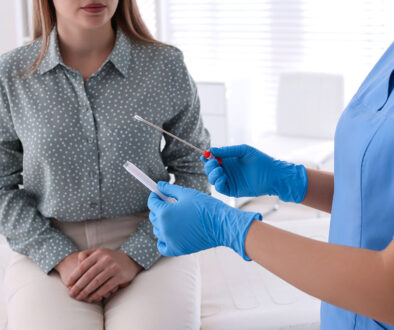What Are the Symptoms of HPV vs Herpes? How to Tell Them Apart
Human papillomavirus (HPV) and herpes simplex virus (HSV or herpes) are both sexually transmitted infections (STIs), but they are not the same thing. In this article, we’ll take a look at HPV vs herpes, and discuss their similarities and differences, including symptoms, prevention, and treatment options.
HPV vs Herpes: What’s the Difference?
HPV, or human papillomavirus, is a common virus affecting millions of people each year. In most cases, the immune system rids the body of HPV before it causes disease, but sometimes HPV infections will last longer and cause changes in cells that may lead to cancer over time, such as cancer of the cervix.
Herpes is an STI caused by herpes simplex virus (HSV). Like some other sexually transmitted diseases (STDs), herpes may have no symptoms or mild symptoms, though it can cause painful sores or blisters around the mouth, genitals or rectum. There is no cure for herpes, but it can be treated.
How Are HPV and Herpes Transmitted?
HPV
HPV is typically spread through vaginal, anal or oral sex with someone who has the virus. It can also be transmitted through skin-to-skin contact during sex. You can get HPV from a partner even if they don’t have signs or symptoms. HPV infections are common; almost all people will become infected with HPV after they become sexually active.
Herpes
Herpes is spread through vaginal, anal or oral sex with someone who has a herpes infection.
You can also get herpes from direct contact with a herpes sore, saliva from someone with an oral herpes infection, or from skin in the oral or genital area of a partner with herpes. It’s possible to get herpes from a partner who does not have visible sores or who doesn’t know they have the infection. The herpes virus affects one in six adults in the U.S., or about 50 million people.
HPV vs Herpes: Signs and Symptoms
HPV Symptoms
An HPV infection may not have any signs or symptoms, and those who have it often don’t know they have it, which is how it can spread easily. In other cases, HPV may cause genital warts.
Herpes Symptoms
Herpes often has no symptoms, or mild symptoms that may be mistaken for other skin conditions. If a herpes outbreak occurs, it can include blisters near or on the genitals, rectum or mouth, which can break open and leave painful sores. An outbreak may also be accompanied by flu-like symptoms such as fever, chills, body aches and fatigue.
Can HPV and Herpes Be Prevented?
HPV
Getting an HPV vaccine is a safe and effective way to protect against an HPV infection, including HPV types that are the most common cause of genital warts and cancer. The first dose of the HPV vaccine should be given to children aged 11 to 12 years old, and the second dose six to 12 months later. The vaccine works best when it’s given before a person is sexually active and exposed to HPV.
If you’re sexually active, you can also use a condom or dental dam when you have vaginal, anal or oral sex to reduce the chances of getting an HPV infection.
Herpes
There isn’t a vaccine to protect against herpes. The only way to prevent genital herpes is to avoid having vaginal, anal or oral sex. If you’re sexually active, the use of condoms and regular STI testing is recommended. Keep in mind, condoms aren’t a fail-safe prevention method, as herpes sores may occur in areas condoms don’t cover, and skin can shed the virus from areas without herpes sores.
How Does HPV and Herpes Affect Your Long-Term Health?
Most HPV infections resolve on their own within two years, though sometimes infections may last longer and can cause certain cancers, which can take years to happen.
Herpes is not curable, but it is manageable with medication. Daily use of antiviral medication, known as suppressive therapy, can limit the number of herpes outbreaks and reduce your risk of spreading the virus.
We can talk to you about the impact of STIs on your long-term health and advise about treatment options that are right for you.
Can HPV and Herpes Be Cured?
The HPV virus itself cannot be cured, but in most cases, the immune system clears it from the body within two years. Herpes also cannot be cured, but can be managed with medication.
Treatment Options for HPV and Herpes
Treatment will depend on the type and severity of the STI you have, your symptoms, and your medical history.
Herpes treatment may include antiviral medications, which taken daily can shorten the length and severity of outbreaks, reduce the number of outbreaks, and limit the risk of transmitting herpes to someone else.
With HPV, there’s no treatment for the virus itself, but if you have an HPV infection that causes genital warts, that can be treated with medication. Since an HPV infection increases your risk of cervical cancer, it’s best to schedule regular Pap smears so it can be detected early, when it’s most treatable.
Associates in Women’s Healthcare: Compassionate Treatment for Common STDs
STDs are very common, and anyone can get them.
Some STDs show no symptoms, so it’s important to see your healthcare provider for testing if you believe you may have one. If left untreated, STDs can lead to serious health issues, including infertility and other complications.
At Associates in Women’s Healthcare, we’re here to help. If you think you may have an STD or want to begin regular testing, it’s easy and convenient to schedule an appointment. Contact us today to get started.
Sources:
- Centers for Disease Control – Herpes:
https://www.cdc.gov/herpes/about/index.html - Centers for Disease Control – HPV:
https://www.cdc.gov/hpv/about/ - American College of Obstetricians and Gynecologists – HPV:
https://www.acog.org/womens-health/faqs/hpv-vaccination - American Colleges of Obstetricians and Gynecologists – Herpes:
https://www.acog.org/womens-health/faqs/genital-herpes
The content within this article and others on this website is only for educational purposes and should not be considered as medical advice. For any questions or concerns, please consult with your healthcare provider.





